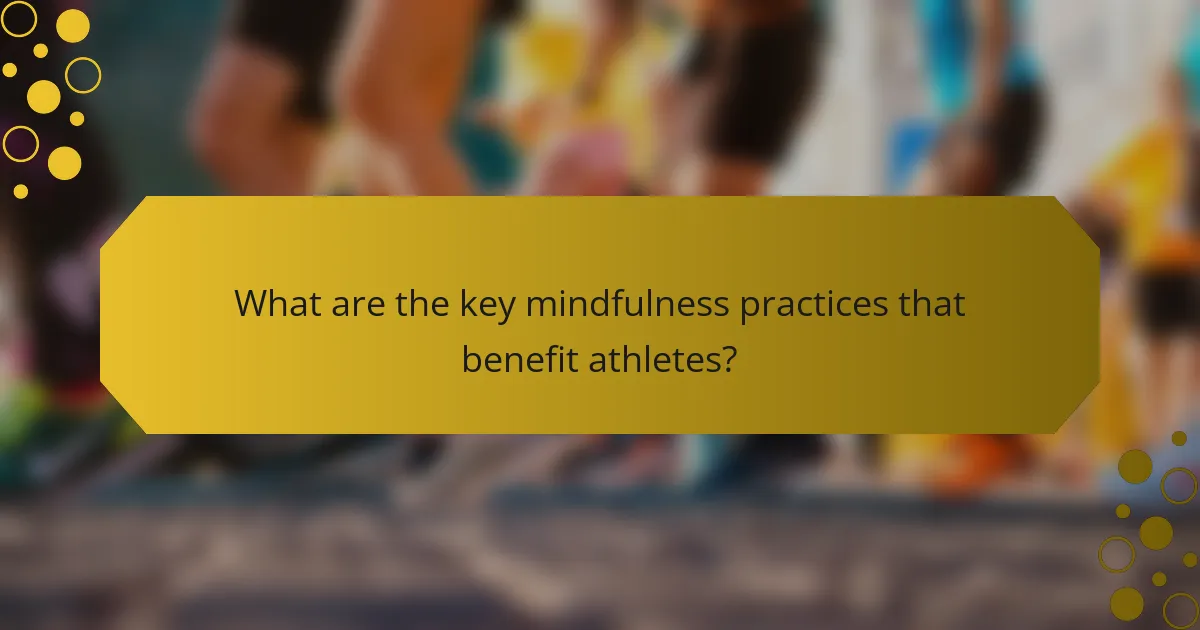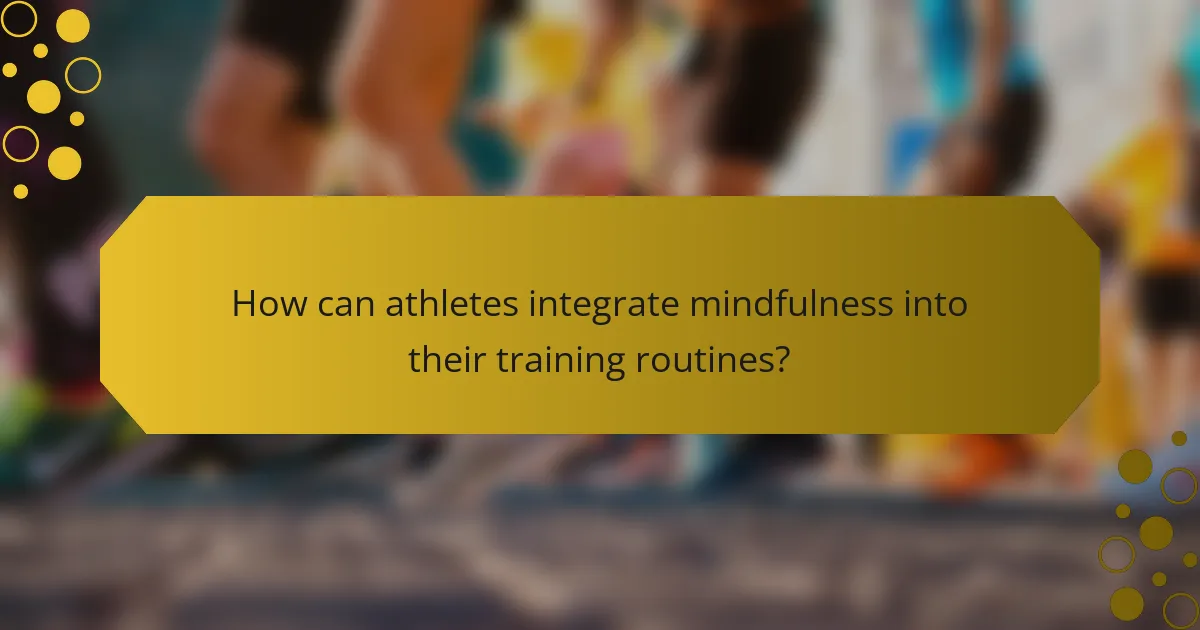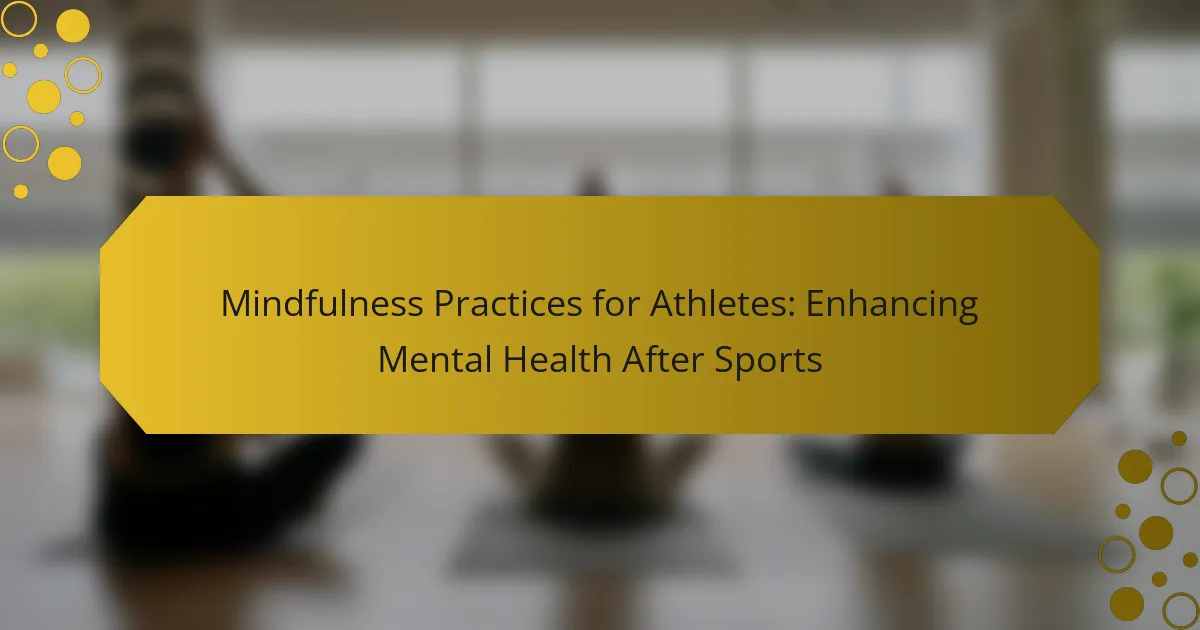Mindfulness practices significantly enhance athletes’ mental health by fostering focus and resilience. Key techniques include meditation, deep breathing, visualization, and body scanning. These methods help reduce anxiety, improve concentration, and promote awareness of physical sensations. Regular engagement in mindfulness can lead to improved performance and overall well-being.

What are the key mindfulness practices that benefit athletes?
Mindfulness practices significantly enhance athletes’ mental health by fostering focus and resilience. Key practices include meditation, deep breathing, visualization, and body scanning.
Meditation helps reduce anxiety and improve concentration. Deep breathing techniques enhance relaxation and manage stress levels. Visualization allows athletes to mentally rehearse their performances, boosting confidence. Body scanning promotes awareness of physical sensations, aiding in injury prevention and recovery.
Implementing these practices can lead to improved performance and overall well-being. Regular engagement in mindfulness can create a positive feedback loop, enhancing both mental and physical aspects of athletic performance.
How does mindfulness impact mental health for athletes?
Mindfulness significantly enhances mental health for athletes by reducing stress and improving focus. Regular mindfulness practices, such as meditation, can lead to lower anxiety levels and better emotional regulation. Research shows that athletes who engage in mindfulness techniques report improved performance and resilience. These practices foster a positive mental state, which is crucial for peak athletic performance.
What role does stress management play in athletic performance?
Stress management significantly enhances athletic performance by improving focus and resilience. Mindfulness practices, such as meditation and breathing exercises, help athletes reduce anxiety and maintain composure during competitions. Research indicates that athletes who engage in mindfulness experience lower stress levels, leading to improved decision-making and performance consistency. Additionally, mindfulness fosters a positive mental state, which can enhance motivation and overall enjoyment of the sport.
What techniques can athletes use for effective stress reduction?
Athletes can use mindfulness techniques like meditation, deep breathing, and visualization for effective stress reduction. These practices enhance focus and promote relaxation, improving overall mental health. Regular meditation can reduce anxiety levels by up to 30%, while deep breathing exercises lower heart rates and foster calmness. Visualization techniques help athletes mentally rehearse performances, reducing performance anxiety and enhancing confidence.
How can visualization enhance performance and mental well-being?
Visualization significantly enhances performance and mental well-being by improving focus and reducing anxiety. Athletes who practice visualization techniques can mentally rehearse their performance, leading to increased confidence and better execution during competition. A study indicates that mental imagery can enhance motor skills by 20-30%, showcasing its effectiveness. Additionally, visualization fosters a sense of calm, which is crucial for maintaining mental health after sports. By integrating these practices, athletes can better manage stress and recover emotionally from competitive experiences.
What are the universal benefits of mindfulness for athletes?
Mindfulness practices offer athletes significant universal benefits, enhancing their mental health post-competition. These practices improve focus, reduce anxiety, and boost resilience, allowing athletes to manage stress effectively. Research indicates that mindfulness can enhance performance through better emotional regulation and increased self-awareness. Regular mindfulness training cultivates a positive mindset, which is crucial for maintaining mental health in high-pressure sports environments.
How does improved focus contribute to athletic success?
Improved focus significantly enhances athletic success by boosting concentration and decision-making. Mindfulness practices, such as meditation and breathing exercises, cultivate this focus, leading to better performance under pressure. Research indicates that athletes who engage in mindfulness report higher levels of mental clarity and reduced anxiety, which are crucial for optimal performance. Enhanced focus allows athletes to maintain composure during competitions, ultimately contributing to their overall success.
In what ways can mindfulness reduce anxiety in competitive sports?
Mindfulness reduces anxiety in competitive sports by enhancing focus, promoting emotional regulation, and fostering resilience. Athletes practicing mindfulness experience decreased stress levels, improved concentration, and a greater sense of control during competitions. Research indicates that these practices can lead to better performance outcomes and overall mental well-being. Techniques such as breathing exercises and visualization are particularly effective in managing pre-competition nerves and maintaining composure under pressure.
What unique mindfulness techniques are tailored for athletes?
Unique mindfulness techniques tailored for athletes include visualization, body scanning, breath control, and mindful movement. These practices enhance focus, reduce anxiety, and improve performance. For example, visualization helps athletes mentally rehearse their performance, while body scanning promotes awareness of physical sensations. Breath control techniques can stabilize emotions, and mindful movement integrates mindfulness into physical training. Each technique addresses specific mental challenges faced by athletes, supporting their overall mental health.
How can breathing exercises specifically aid athletes?
Breathing exercises can significantly enhance athletes’ performance by improving focus and reducing anxiety. These techniques promote relaxation, which aids in recovery and mental clarity. Research shows that controlled breathing can lower heart rate and increase oxygen efficiency, leading to better endurance. Additionally, athletes using these practices report heightened awareness and improved emotional regulation during competition.
What is the significance of body scan meditation in sports?
Body scan meditation significantly enhances athletes’ mental health by promoting relaxation and self-awareness. This practice allows athletes to connect with their bodies, reducing anxiety and improving focus. Research indicates that regular engagement in body scan meditation can lead to increased emotional resilience and better performance under pressure. Additionally, it serves as a unique tool for athletes to recover mentally after intense training or competition, fostering a positive mindset.
What rare mindfulness practices can enhance an athlete’s mental resilience?
Rare mindfulness practices that can enhance an athlete’s mental resilience include forest bathing, sound meditation, breathwork, and mindful movement. These practices promote deep relaxation and focus. Forest bathing, or shinrin-yoku, connects athletes with nature, reducing stress and improving mood. Sound meditation uses vibrations to foster mental clarity and emotional balance. Breathwork techniques enhance oxygen flow and calm the nervous system. Mindful movement integrates physical activity with awareness, strengthening both body and mind. Each practice offers unique benefits, contributing to overall mental health and resilience in sports.
How can nature immersion practices benefit athletes’ mental health?
Nature immersion practices significantly enhance athletes’ mental health by reducing stress and improving focus. Engaging with nature fosters mindfulness, allowing athletes to reconnect with their surroundings and themselves. Studies show that spending time in natural environments lowers cortisol levels, promoting relaxation and mental clarity. This practice can lead to improved performance and resilience, essential traits for athletes. Regular exposure to nature also encourages a positive mindset, which is crucial for mental well-being in competitive sports.
What is the role of gratitude practices in sports psychology?
Gratitude practices enhance athletes’ mental health by fostering positive emotions and resilience. These practices encourage focus on strengths and achievements, improving overall performance. Research shows that gratitude increases well-being, reduces anxiety, and promotes a growth mindset in sports. Regularly expressing gratitude can create a supportive team environment, strengthening relationships among athletes.

How can athletes integrate mindfulness into their training routines?
Athletes can integrate mindfulness into their training routines through focused breathing, visualization techniques, and meditation. These practices enhance mental resilience and improve focus during performance. Mindfulness training can reduce anxiety and promote a positive mindset, essential for peak athletic performance. Regularly practicing mindfulness can lead to better emotional regulation and increased self-awareness, contributing to overall mental health.
What are the best practices for daily mindfulness exercises?
Daily mindfulness exercises for athletes include focused breathing, body scans, and visualization techniques. These practices enhance mental clarity and emotional resilience, crucial for optimal performance.
1. Focused Breathing: Spend five minutes each day concentrating on your breath. This calms the mind and reduces anxiety.
2. Body Scans: Perform a body scan to increase awareness of physical sensations. This helps in recognizing tension and promotes relaxation.
3. Visualization Techniques: Visualize successful performances to build confidence and enhance motivation. This practice can improve mental readiness before competitions.
4. Gratitude Journaling: Write down three things you are grateful for each day. This fosters a positive mindset and encourages mental well-being.
How can teams implement mindfulness programs effectively?
Teams can implement mindfulness programs effectively by integrating structured practices into their training routines. Begin with short, guided sessions focusing on breath awareness and body scans. Incorporate regular check-ins to assess mental health and provide support. Utilize technology, such as mindfulness apps, to facilitate ongoing practice. Encourage open discussions about mental well-being, creating a culture of support and understanding. Lastly, measure the program’s impact through feedback and performance metrics to ensure continuous improvement.
What strategies can coaches use to promote mindfulness among athletes?
Coaches can promote mindfulness among athletes through structured techniques. Incorporating breathing exercises helps athletes focus and reduce anxiety. Regular mindfulness meditation sessions enhance emotional regulation and concentration. Encouraging body awareness through yoga improves mental resilience. Creating a supportive environment fosters open discussions about mental health.
What common mistakes should athletes avoid when practicing mindfulness?
Athletes should avoid common mistakes like inconsistent practice, neglecting self-compassion, and overthinking their performance. These pitfalls can hinder the benefits of mindfulness. Consistency is key; sporadic practice reduces effectiveness. Self-compassion fosters a positive mindset, while overthinking can lead to anxiety and distraction.
What expert insights can enhance mindfulness practices for athletes?
Expert insights can significantly enhance mindfulness practices for athletes by integrating techniques tailored to their unique mental health needs. Strategies such as visualization, breathing exercises, and body scans foster focus and reduce anxiety. Research indicates that athletes practicing mindfulness experience improved performance and emotional regulation. Incorporating mindfulness into training routines promotes resilience, helping athletes manage stress and recover from setbacks effectively. Regular practice can lead to a lasting positive impact on mental health and overall well-being.
How can athletes measure the impact of mindfulness on their performance?
Athletes can measure the impact of mindfulness on performance through self-assessments and performance metrics. Regularly tracking mood, focus, and stress levels can provide insights into mental state changes. Additionally, comparing performance outcomes before and after implementing mindfulness techniques can reveal correlations. Research indicates that mindfulness practices can enhance concentration and reduce anxiety, leading to improved athletic performance.
